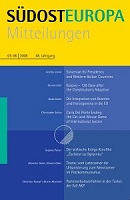Slowakei 2016: Europa blickt nach Bratislava
Slovakia 2016: Europe Looks to Bratislava
Refugee Crisis, Parliamentary Elections, EU Council Chairmanship
Author(s): Michael SchmunkSubject(s): Politics / Political Sciences, Social Sciences, Geography, Regional studies
Published by: Südosteuropa Gesellschaft e.V.
Keywords: Slovakia; EU Council Chairmanship
Summary/Abstract: As is the case in many other EU member states, post-communist Slovakia, which became part of the EU in 2004 and of NATO in 2009, has increasingly had to cope with populist-right wing and neo-fascist movements and parties. Some of them are even represented in parliament since the elections in spring 2016. After a single issue election campaign focusing on the European refugee crisis the populist left “Direction-Socialdemocracy” party (SMER-SD), which was used to govern alone with its Prime Minister Robert Fico, unexpectedly incurred a significant electoral defeat. Fico managed, however, to stay in power, leading a government coalition of four parties that are not closely affiliated to each other in political terms. He hopes to keep the coalition together until at least the end of the country’s first chairmanship of the Council of the European Union which ends on 31 December 2016. Slovakia has decided to run its chairmanship as an honest broker rather than pursuing an ambitious national agenda given the seriousness of multiple crises the EU has been facing for a long time, with the Greek financial crisis, the dramatic influx of refugees, and the possible Brexit heading the list of challenges. Slovakia’s harsh refusal to accept any of the civil war refugees and in particular Muslims has gained the Danube republic widespread international criticism, culminating in the reproach that Slovaks were abandoning “European solidarity.” Slovakia, however, made it clear to Western member states which still dominate the EU, that it refuses to substantially modify its cultural-normative, societal and religious heritage as part of the “rectifying revolution” that Brussels and the West want the new Eastern members to implement.
Journal: Südosteuropa Mitteilungen
- Issue Year: 2016
- Issue No: 03
- Page Range: 22-41
- Page Count: 20
- Language: German
- Content File-PDF

